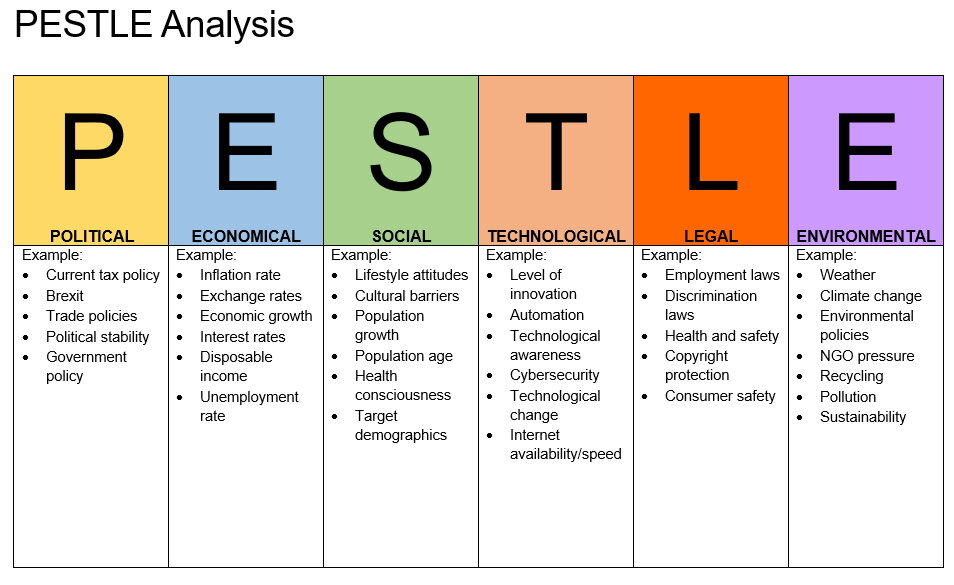What Is PESTLE Analysis?
PESTLE is a handy acronym for exploring external factors. It stands for Political, Economic, Social, Technological, Legal, and Environment.
The purpose of PESTLE is to give you a clear idea about your environment as a business. Are there any key opportunities that you can exploit for rapid growth? Alternatively, should you be focusing on any threats that exist, or have a potential to materialise in future?
These are all questions for which you can find answers using this tool. The advantages are pretty self-explanatory,– the lower the level of uncertainty in your business, the lower your risk. PESTLE analysis helps you plan.
Its broken down into the following sections:
1. Political Factors
Politics can have a massive impact on business. Just look at what is happening in the United States or the United Kingdom now.
Political factors that could affect your business include elections, government formation, and their impact on issues such as taxes and trade. Political instability is yet another factor, with war, civil unrest and ongoing protests capable of having a negative impact on your organisation.
2. Economic Factors
The health of a country's economy is determined by a variety of elements, including political and social; these are all interconnected systems, after all. From a business perspective, factors such as inflation rates, current rates of interest and other fiscal policies of the government, and foreign exchange rate can all have massive implications.
Long-term economic trends can also determine the future trajectory of your business; effective planning requires a clear insight into the present economic climate. The future cannot be predicted with precision, of course, but you can still glean broad trends if you have enough information about the presence.
3. Social Factors
We exist as active members of a society and are shaped by our culture, customs, and conventions. However, these aspects do not remain static and can change with time. Business organisations need individuals in multiple capacities – as consumers, as employees/staff, and as representatives of other firms (vendors, clients).
Your business needs to be respectful towards the social and religious norms of your target market, too.
4. Technological Factors
Technology is having an unprecedented impact on all aspects of life, including business. The capabilities enabled by the growth of the internet have revolutionised the way business organisations interact with their target demographics.
If you want to stay relevant in today's market, then you have to be aware of these technological changes, which, given the pace of development in IT and other allied fields, can admittedly feel like a tall order. Modern technologies are undoubtedly worth the investment, though, given the growth and productivity they facilitate.
5. Legal Factors
Businesses are bound by the laws of the land as well as any international treaties and agreements wherever applicable; statutory factors are closely related to the political environment. However, the legislature framed by the government is only a part of the legal challenges that your business may encounter.
As business owners, we need to keep abreast of any changes in the legal environment.
6. Environmental Factors
Concerns about issues including global warming and environmental degradation have reached unprecedented levels in recent years, with the climate strike undertaken by millions of schoolchildren, and the awareness efforts of Greta Thunberg, putting corporate responsibility firmly in the spotlight.
Consumers are increasingly concerned about the environmental impact of their actions, including any purchases they make in the market. They want sustainable and environmentally friendly products, from companies that are willing to do more to offset their carbon footprint.

